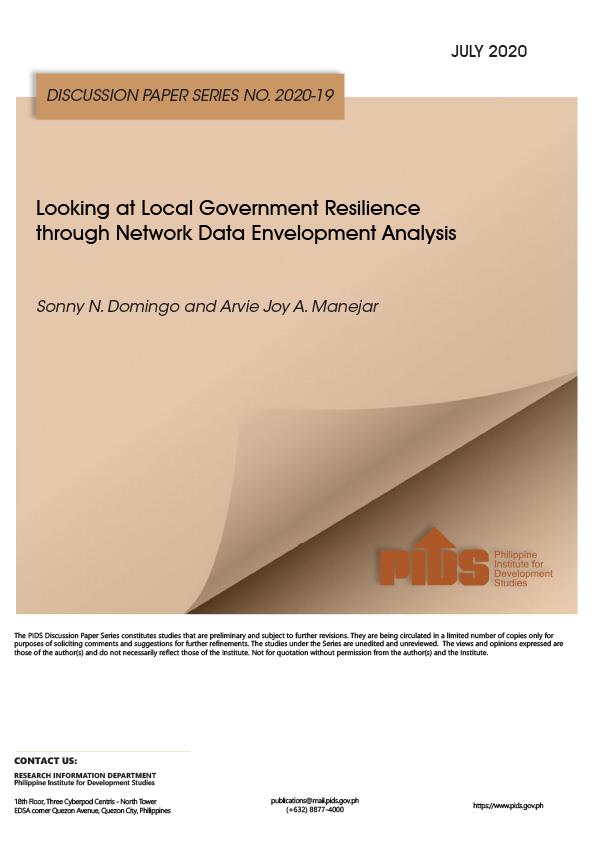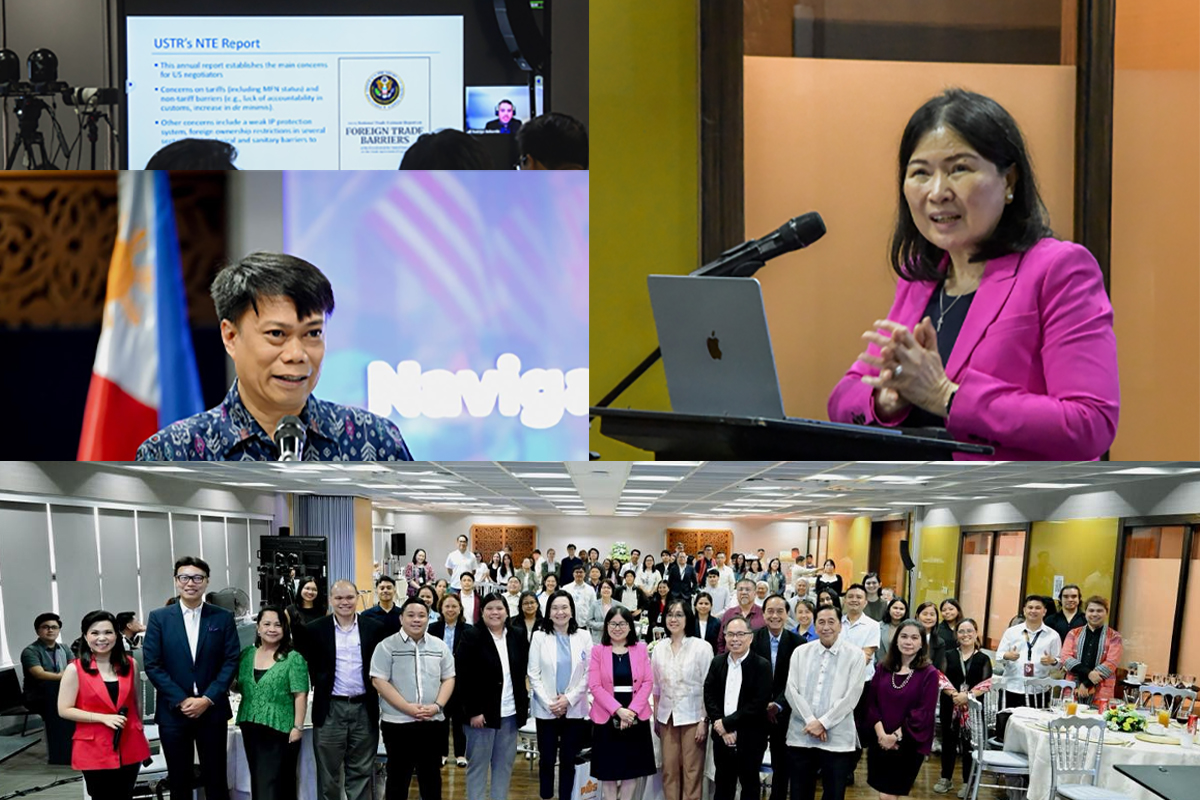The World Bank Group partnered with state think tank Philippine Institute for Development Studies (PIDS) in a forum aimed at strengthening the potential of the Philippines' small and medium enterprises in the local and global markets.
Titled "Increasing Philippine SMEs' Participation in the Global Value Chains", the forum coincided with the celebration of the 14th Development Policy Research Month (DPRM), which centers on the theme "Investing in Risk Reduction for a Resilient Philippines".
"Building resilient systems in our country would not be complete if we disregard our micro, small and medium enterprises. After all, they are the lifeblood of the Philippine economy," said Dr. Sheila Siar, PIDS director for research information, in her opening remarks.
Data from the Philippine Statistics Authority show that MSMEs represent 99.6 percent of all enterprises in the country, accounting for 36 percent of the gross domestic product in 2014. Sixty-three percent of the total jobs generated by all business establishments were contributed by the MSME sector.
"There is no doubt that MSMEs are the backbone, the heart, and the lungs of the economy," said Cecile Fruman, Trade and Competitiveness Director of the World Bank Group. She added that MSMEs are critical to the country's economic growth, employment creation, and poverty reduction.
However, many factors threaten their competitiveness in the global market. These include low rate of business entry, low productivity, and the stagnation of the sector’s structure.
The more productive medium-sized enterprises, for instance, only account for 0.4 percent of the total number of MSMEs in the country, compared to micro enterprises, which comprise 90.3 percent of the sector.
"Very few firms are really able to get into that medium segment," Fruman added.
Vulnerable to natural hazards, disasters
One possible reason to the stagnation of the MSMEs' structure is their vulnerability to disasters.
"Micro enterprises, particularly, are more vulnerable to natural hazards and disasters than medium and large enterprises," Siar explained. "They are usually the ones severely affected by strong typhoons, floods, and earthquakes."
Unfortunately, there is no standby government support to refinance businesses in the Philippines in the event a disaster occurs, according to World Bank Senior Financial Sector Specialist Nataliya Mylenko.
Moreover, despite a law requiring banks to allocate at least 10 percent of their credit resources to MSMEs, local banking system's compliance remained low at 9.2 percent for the first quarter of 2016, based on data released by the Bangko Sentral ng Pilipinas. This is because formal financial institutions generally regard MSMEs as high-risk clients.
"The banks actually would just opt to pay the penalty instead of giving loans to MSMEs," said Dr. Romeo Balderrama, president of the Philippine Homestyle and Holiday Decor Association, one of the company-representatives of the MSME sector in the forum.
Development Bank of the Philippines Vice President Benel Lagua said his institution is willing to engage in disaster financing. However, it can be a "little bit costly" to them.
Mylenko explained that while the government carries the cost related to reconstruction and recovery, it fails to sufficiently cover MSMEs after calamities.
"There needs to be an element of public subsidy [to support them]," she argued.
'More systematic thinking' needed
Mylenko, however, clarified that the financing issue is only one part of the problem Philippines MSMEs are facing.
"There are also issues on regulation, skills, and innovation," she said.
She added that since disasters are inevitable in the Philippines, a "more systematic thinking" is needed.
Relatedly, PIDS President Gilberto Llanto underscored the importance of "resilience thinking" in a press conference earlier this month. "There is a need for us to broaden our understanding of risks and resilience. We need to look beyond natural hazards and acknowledge that the sources of risks are many and that those risks are interconnected," said Llanto.
This year's DPRM highlights the crucial role of building multiple resilience systems, including at the level of MSMEs.
PIDS will also conduct other events related to promoting resilience thinking. The Second Annual Public Policy Conference on "Risks, Shocks, Building Resilience" will be held on September 22. This will be followed by a policy forum on social protection and risk management at the University of San Carlos in Cebuy City on September 29.
The DPRM is celebrated across the country every September in view of Malacanang Proclamation No. 247 issued in 2002. The proclamation declares the observance of a DPRM to promote and draw public awareness and appreciation of the importance of policy research in the formulation of sound policies, programs, and projects. The proclamation also designated PIDS as the lead government agency in the yearly celebration of the DPRM. ###
Titled "Increasing Philippine SMEs' Participation in the Global Value Chains", the forum coincided with the celebration of the 14th Development Policy Research Month (DPRM), which centers on the theme "Investing in Risk Reduction for a Resilient Philippines".
"Building resilient systems in our country would not be complete if we disregard our micro, small and medium enterprises. After all, they are the lifeblood of the Philippine economy," said Dr. Sheila Siar, PIDS director for research information, in her opening remarks.
Data from the Philippine Statistics Authority show that MSMEs represent 99.6 percent of all enterprises in the country, accounting for 36 percent of the gross domestic product in 2014. Sixty-three percent of the total jobs generated by all business establishments were contributed by the MSME sector.
"There is no doubt that MSMEs are the backbone, the heart, and the lungs of the economy," said Cecile Fruman, Trade and Competitiveness Director of the World Bank Group. She added that MSMEs are critical to the country's economic growth, employment creation, and poverty reduction.
However, many factors threaten their competitiveness in the global market. These include low rate of business entry, low productivity, and the stagnation of the sector’s structure.
The more productive medium-sized enterprises, for instance, only account for 0.4 percent of the total number of MSMEs in the country, compared to micro enterprises, which comprise 90.3 percent of the sector.
"Very few firms are really able to get into that medium segment," Fruman added.
Vulnerable to natural hazards, disasters
One possible reason to the stagnation of the MSMEs' structure is their vulnerability to disasters.
"Micro enterprises, particularly, are more vulnerable to natural hazards and disasters than medium and large enterprises," Siar explained. "They are usually the ones severely affected by strong typhoons, floods, and earthquakes."
Unfortunately, there is no standby government support to refinance businesses in the Philippines in the event a disaster occurs, according to World Bank Senior Financial Sector Specialist Nataliya Mylenko.
Moreover, despite a law requiring banks to allocate at least 10 percent of their credit resources to MSMEs, local banking system's compliance remained low at 9.2 percent for the first quarter of 2016, based on data released by the Bangko Sentral ng Pilipinas. This is because formal financial institutions generally regard MSMEs as high-risk clients.
"The banks actually would just opt to pay the penalty instead of giving loans to MSMEs," said Dr. Romeo Balderrama, president of the Philippine Homestyle and Holiday Decor Association, one of the company-representatives of the MSME sector in the forum.
Development Bank of the Philippines Vice President Benel Lagua said his institution is willing to engage in disaster financing. However, it can be a "little bit costly" to them.
Mylenko explained that while the government carries the cost related to reconstruction and recovery, it fails to sufficiently cover MSMEs after calamities.
"There needs to be an element of public subsidy [to support them]," she argued.
'More systematic thinking' needed
Mylenko, however, clarified that the financing issue is only one part of the problem Philippines MSMEs are facing.
"There are also issues on regulation, skills, and innovation," she said.
She added that since disasters are inevitable in the Philippines, a "more systematic thinking" is needed.
Relatedly, PIDS President Gilberto Llanto underscored the importance of "resilience thinking" in a press conference earlier this month. "There is a need for us to broaden our understanding of risks and resilience. We need to look beyond natural hazards and acknowledge that the sources of risks are many and that those risks are interconnected," said Llanto.
This year's DPRM highlights the crucial role of building multiple resilience systems, including at the level of MSMEs.
PIDS will also conduct other events related to promoting resilience thinking. The Second Annual Public Policy Conference on "Risks, Shocks, Building Resilience" will be held on September 22. This will be followed by a policy forum on social protection and risk management at the University of San Carlos in Cebuy City on September 29.
The DPRM is celebrated across the country every September in view of Malacanang Proclamation No. 247 issued in 2002. The proclamation declares the observance of a DPRM to promote and draw public awareness and appreciation of the importance of policy research in the formulation of sound policies, programs, and projects. The proclamation also designated PIDS as the lead government agency in the yearly celebration of the DPRM. ###












